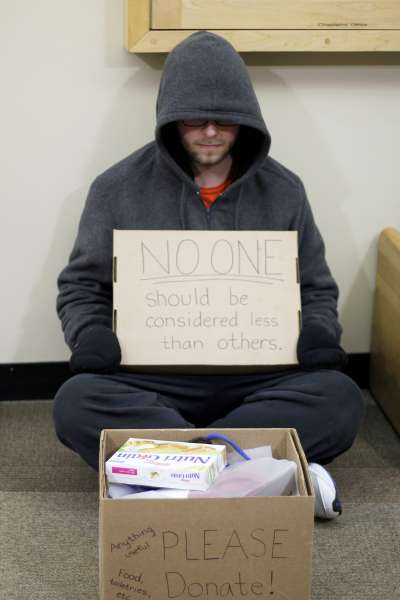The students from the FTS: Politics of Homelessness class took part in the annual Sleep Out Nov. 16 – 19. While there were similar experiences hosted on campus before, the official Sleep Out in connection with this class first occurred 14 years ago.
“Every year, I’ve changed something to ramp it up,” Professor Richard Leitch said. “Sleep outs were originally one night, usually a Friday, then changed to two nights, then three to include Sunday.”
Eventually, the Sleep Out was changed to weekdays so students would have to go through their regular schedule as actual homeless students would have to do.
“I want them to realize what it’s like to be a student and to work while being homeless,” Leitch said. “They must go to class, and if they have student employment they have to do that, too. Every year, I have a couple athletes in class and they’re required to go to practice.”
The Sleep Out has been made longer and been moved to weekdays in an effort to make it more realistic for students who participate. However, it cannot be ignored that the situation is still quite different for a person who is homeless for an extended period of time.
“If someone is truly homeless and can’t go inside, but a kind stranger gives them a sleeping bag, it won’t help,” Leitch said. “The homeless walk all night to keep warm; they go to 24 hour places like McDonald’s until they get kicked out and have to move on. This is why they sleep during the day.”
In addition to the experience of being homeless, Leitch expressed hope that his students would learn another lesson:
“I want to change the image of affordable housing. Everyone lives in affordable housing for their income. By definition, where you live is affordable housing for you. I want my students to see this in their own communities.”
Students who are experiencing homelessness for the first time through the Sleep Out were able to note some difficult aspects after just one night.
“The biggest thing for me would be privacy,” First Year Mandoyu Adem said. “Sleeping in Chapel, I was trying to hold back a cough because I didn’t want to disrupt everybody else, and I realized how much I take my privacy for granted. In public, you don’t have your own space to hide in. You have to respect social order and you’re always watching other people.”
Not only are students participating in the Sleep Out noting their own reactions to others, they’ve noticed a difference in how their peers treat them.
“For the most part people try to ignore us,” First-Year Zach Lardy said. “Every once in a while, there will be someone who is generous and wants to help us. They’ll either donate to us or leave extra food on the conveyor belt. Most of the time, though, people will act like we are not even there.”
This lack of acknowledgment proves frustrating for some. Others, however, have noticed an increase in attention from passersby.
“It’s weird getting secret looks,” Adem said. “Just glances. Then you catch them and they look away. That’s the most interesting part for me. Because when you’re in your normal clothes you don’t get those looks.”
Similar to their professor, students recognize that their time being homeless is limited and cannot show them everything that they would experience if they had to live this way for more than a few days.
“We’re not actually being homeless,” Adem said. “I talked to a lady who said she never felt safe when she was homeless, and during the time that I spent sleeping in the chapel, I never felt that I was in danger, while homeless people feel threatened every day, even in shelters. ”
Those participating in the Sleep Out are well aware of the difficulties homeless people face on a daily basis. Many of them readily admit that the experience was still more challenging than they had expected.
“It’s much harder to be homeless than I thought,” First Year Huu Nguyen Do said. “Sleeping one night in the chapel was hard enough. I can’t imagine what it’s like to do this for a long time.”
Following the Sleep Out, students who participated and those who witnessed it have had a chance to raise their consciousness about the topic of homelessness. There is hope that this knowledge will be used to make change.
“There is rarely a simple explanation for why someone is homeless,” Leitch said. “It will take a concerted effort to end homelessness. I hope students see facets of it which they can change.”
-Kaity Young
